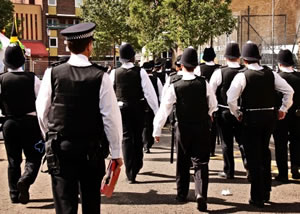Local Borough Police Forces to Be Scrapped in Radical Shake Up
Hounslow, Ealing and Hillingdon to be merged into one Basic Command Unit
The Metropolitan Police have announced radical changes to the structure of policing in the local area.
Police in three boroughs in the area are to be merged into one Basic Command Unit (BCU. Hounslow, Ealing and Hillingdon will be the first to be subsumed along with another unit in Richmond, Wandsworth and Kingston at the start of a roll out of the new structure over the rest of London in the next 12 months in which 32 borough services will be replaced by 12 BCUs. Opponents of the move claim that trials of the scheme in other London boroughs have shown that emergency response times have deteriorated after the changes.

Each BCU will be led by a chief superintendent who will be the BCU Commander. The Met claim that with a BCU, people, buildings and resources will be shared across the borough boundaries meaning greater flexibility in how these are used. It is not known at this stage who the new BCU commander will be or where he or she will be based.
The move is part of a programme by the Met to make make savings of £325m by 2021/22. Police officer numbers are expected to fall to 30,000 by April, and further by 2021.
A statement issued by the Met says, “We need to plan for a future with less, and become more resilient so we can continue to meet our financial and operational challenges, and our current and future policing challenges - terrorism and safeguarding in particular. Without significant changes in how we manage our resources we would be unable to meet these head on.
“As well as saving money and increasing efficiency, we want to invest in other areas of policing which the new model will enable us to do more effectively. Increasing community confidence is a priority and these changes will build on the success of Safer Neighbourhoods, where local officers are visible in each London ward.
“We have met our commitment to put two Dedicated Ward Officers (DWOs) and one PCSO in every London ward. These officers work with local people on local priorities and are not taken away to help with policing elsewhere in London.”
BCUs will also bring together the investigation of these crimes and deploy specialist officers and detectives directly to the scene of serious incidents at an earlier stage. The Met says this means they can set the investigation strategy early on and make contact with the victim, reducing the number of different officers they have to deal with.
The BCU model has been tested in two areas since January 2017, bringing together Barking & Dagenham, Redbridge and Havering boroughs; and Camden and Islington boroughs.
Leading the work is Deputy Assistant Commissioner Mark Simmons. He said. "Local policing is at the heart of what the Met does every day, and we will improve it further by offering a service that is more personal and responsive to the needs of Londoners.
"BCUs will allow us to put first victims of crime and those people who need us the most. Our new structure will also give us the resilience and consistency we need across the whole of London, so we can continue to respond to large scale incidents and meet the financial and operational challenges we are facing."
The move has attracted criticism from Liberal Democrat London Assembly Member Caroline Pidgeon who said," I believe it is dishonest and deliberately misleading for the Mayor to claim that the BCU model is the only option available. The Mayor should have set out the pros and cons of reorganising the Met and our police stations, instead of going on a scare offensive. The public should have been presented with the full facts about the BCU trials and consulted before going ahead with such a drastic reorganisation."
She says that the The Met’s own examination of the trials of BCUs (in the boroughs of Camden, Islington, Barking & Dagenham, and Havering) have shown that the changes have led to many months of deteriorating emergency response times. Ms Pidgeon adds, "These plans are poorly thought out and certainly do not take the views of local people into account."
The 12 Basic Command Units (BCUs) are:
Hammersmith and Fulham, Kensington and Chelsea, Westminster,
Kingston, Merton, Richmond, Wandsworth
Bromley, Croydon, Sutton
Bexley, Greenwich, Lewisham
Barking and Dagenham, Havering, Redbridge
Ealing, Hillingdon, Hounslow
Lambeth, Southwark
Enfield, Haringey
Hackney, Tower Hamlets
Camden, Islington
Barnet, Brent, Harrow
Newham, Waltham Forest
February 18, 2018
Related links
|